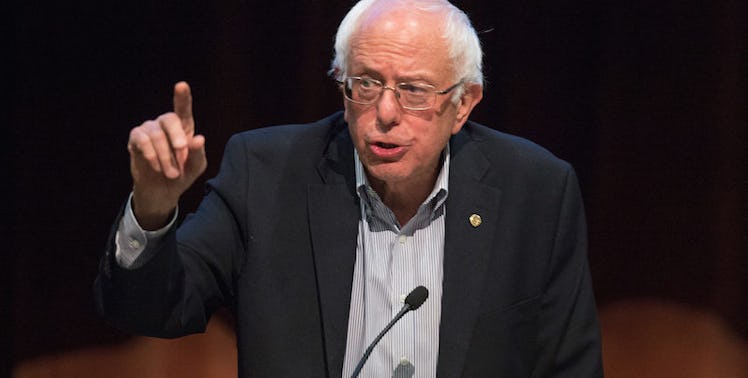
Bernie Sanders Sealed His Fate As Internet Darling In Democratic Debate
Last night was a big night for the Democratic presidential candidates.
All five of them -- Hillary Clinton, Bernie Sanders, Martin O’Malley, Jim Webb and Lincoln Chafee — took to the stage to tell America what they’re all about.
There were good and bad moments for all of them (except for Jim Webb, who spent most of his time complaining that he wasn’t given enough time). But one candidate ran away with an incalculably important victory: the Internet.
Bernie Sanders has been the Internet's candidate for a long time.
For one metric, the subreddit “SandersForPresident” has gained over 117,000 subscribers since its creation in January 2014, and has raised over $300,000 in grassroots dollars.
It has also spawned 46 state-specific subreddits for the campaign.
For another metric, Bernie Sanders quickly broke Obama’s 2008 fundraising record by raising $25 million in small donations, due to his Internet success.
The Internet loves Bernie Sanders almost as much as it loves cats.
It’s clear that he planted his flag there a long time ago. However, last night at the debate, he hammered that flag down even further.
Twitter was “feeling the Bern” during the nearly three-hour debate, as Bernie Sanders managed to rake in 35,000 new followers.
Sanders far outpaced the other candidates, who added a little over 23,000 followers combined.
While it’s not a real indication of the electorate, it is a significant jump.
It represents a 5 percent increase in followers, while other candidates (Clinton included) saw a less than 1 percent increase.
In a strange correlation, CNN announced Hillary Clinton was victorious in the debate, while simultaneously publishing a Facebook poll that declared Sanders the winner by 75 percent.
Time's front page website contains the headline, "Clinton Cruises," while it also published an online poll that showed Sanders winning by 71 percent of unique votes.
The only Sanders headline on Time's front page as of this writing is an article about Sanders' defense of Clinton on the email scandal.
While there’s no question Sanders is the Internet’s candidate, the print and broadcast media doesn’t seem to reflect this.
There are probably a couple reasons.
First, Internet polls are not entirely reliable. They can easily be gamed or cheated.
For example, if one forum tells its users to vote on a poll, you can end up with a soft drink named “Hitler did nothing wrong.”
Another reason for the disparity is the fact that Internet users primarily represent only a certain type of voter: you, the Millennial.
You’re the demographic that makes up most of the Internet. So the vast amount of online support for Sanders represents that and possibly not much else.
For Sanders to have a better chance in the actual election, he needs to gain some traction in landscapes outside of the Internet.
The debates can and will help him do that, but there are still some major things standing in his way.
The biggest among them is his self-proclaimed socialism.
Although he has now changed the moniker to “democratic socialism,” the general American electorate is still pretty afraid of that word.
However, in Sanders' own words, he plans to get over this by “teaching America what democratic socialism is.”
America was indeed curious, as Merriam-Webster searches for the term “socialism” spiked during the debate.
Another big hit for Sanders last night was his apparent support for recreational marijuana use, an issue pretty important to Internet users for reasons that are … let's just say, self-evident.
With Sanders taking over the Internet, and Clinton dropping in national polls, it’s pretty clear that something big is happening on the Democratic side of the race.
Winning the Internet will probably not win you the election, but it’s a big help.
No one could have suspected that the Vermont senator would pose such a threat to a behemoth candidate like Hillary Clinton, yet here we are.
It reminds me of the day a young senator from Chicago unexpectedly won the Iowa Caucus, and caused most of America to turn around and say, “Wait, who’s Barrack Obama?”
The Internet is almost like its own swing state.
It can be red or blue, it can raise money for you, it can run attack ads against you and it can help you get your message across.
It’s just one piece of the giant puzzle that is winning a presidency. But if you can nab it like Sanders has, you might be in pretty good shape.
Whether or not it’s enough to actually win the general election, only time will tell.
For now though, the World Wide Web is feeling the Bern.